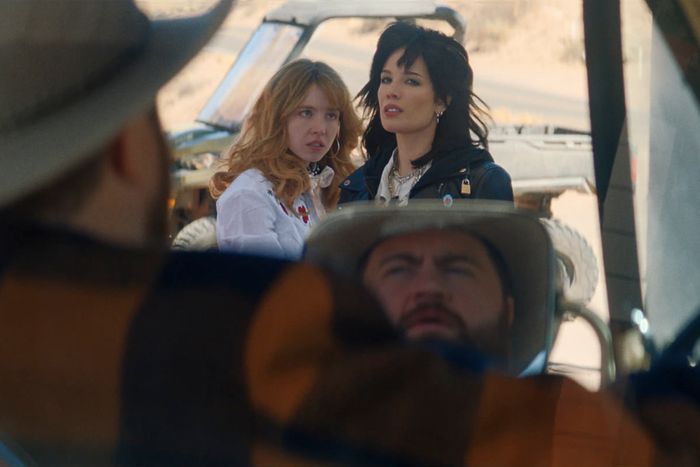
Sydney Sweeney plays a waitress named Penny Jo Poplin, who works at a diner, worships Dolly Parton, and dreams of running away to Nashville to become a country-music star, in Americana, an indie that premiered at SXSW in 2023 but is only reaching theaters this week. This wouldn’t be especially noteworthy on its own, but over the course of that two-year stretch, Sweeney has gone from an HBO breakout to a full-on movie star. In the process, she has become a kind of human Rorschach blot for the online right, which is determined to claim the act of being blonde, blue-eyed, and busty as innately conservative. When American Eagle blew up the internet last month by launching a new Sweeney-centric campaign, the ads didn’t go viral because of their sultriness, but because they blundered right into the middle of an ongoing culture war. Sweeney slithers into a pair of wide-leg jeans and muses about how traits like personality, hair, and eye color are inherited; the ad tagline is “Sydney Sweeney has great jeans.” If it’s hard to imagine a bunch of marketing execs coming out of a brainstorm session intent on courting the eugenics crowd, it’s also impossible to believe that anyone involved with these ads wasn’t aware of their light flirtation with fascism. They’re punning about genetic superiority while natalists try to stoke panic about declining white birth rates and while the country aggressively militarizes against immigrants. It’s bait, and in that sense, it worked (maybe).
The irony of Americana finally coming out in the middle of this mess is that it’s a ’90s-style ensemble crime movie that engages in a sly exploration of the iconography and mythology we use to define the country. The directorial debut of Tony Tost, a poet who has more recently worked as the showrunner of the second season of Poker Face, Americana is about a group of people vying for possession of a Lakota ghost shirt stolen from a wealthy white collector, one worth hundreds of thousands of dollars. Told Pulp Fiction style, in a series of nonlinear chapters tied to different characters, it’s got more on its mind than characters killing each other — though that of course starts happening as the story lines converge. There are cowboys like Lefty Ledbetter (Paul Walter Hauser), the good-natured ranch hand who teams up with Penny Jo, and Native Americans like Ghost Eye (Zahn McClarnon), who runs a militant organization in the tradition of the American Indian Movement. There are also fundamentalist cults like the one the punky Mandy (Halsey) grew up in, standard-issue criminals like Mandy’s violent boyfriend, Dillon (Eric Dane), and predatory higher-ups making money off the culture everyone else creates, like smarmy tourist-attraction owner Roy Lee Dean (Simon Rex) and wealthy collector Pendleton Duvall (Toby Huss). The movie is called Americana, not America, and while it treats characters as mixtures of what they were born into and what they chose for themselves, it suggests that there’s something kitschy about the very idea of national identity, whether it’s defined by what’s in your display case or the color of your eyes.
Take Mandy’s father, Hiram (Christopher Kriesa), and his compound where women dress like pioneers and act subservient while men carry firearms and make decisions. He’s justified this hierarchy via throwback biblical righteousness, but it’s really an excuse for him to trade sexual access to his daughters for money and political favors. Or take Ghost Eye, who talks of embracing tradition and whose cohort is armed with bows and arrows, but who chose his nickname because he’s a fan of the Jim Jarmusch movie Ghost Dog: The Way of the Samurai. Or take Pendleton, a blowhard who asks his guests, “Why does America, with all this violence and toxicity and problematic history, produce more artistic geniuses than any other fucking country?” (It’s a rhetorical question; he’s the only one who gets to talk.) If Americana sometimes sacrifices its momentum for the sake of dwelling on these ideas, it still manages to approach them with a sense of humor — and never more so than with Cal (Gavin Maddox Bergman), a western-obsessed boy who, either thanks to an act of spiritual possession or a bout of disassociation due to his traumatic home life, sees the ghost shirt and immediately declares himself the reincarnation of Sitting Bull. He seeks out a bemused Ghost Eye, whose response to this solemn white child informing him about the customs of his people is to mutter, “This ain’t exactly the golden age of cultural appropriation right now.”
What it is, instead, is a golden age for reactionary retaliation against a hallucination in which white people have been sidelined by a coalition of the non-white, the queer, the trans, the fat, and the blue-haired. Something it’s only possible to believe if your experience of mainstream culture is limited to select Dove ads and Disney casting announcements. It’s also why Sweeney’s role in this movie is such an interesting one — especially because she’s not the star, and, while her character’s romance with Lefty is genuine and sweet, she’s also not the standout. Lefty makes a crack at one point about how if it weren’t for her stammer, she wouldn’t be giving him the time of day, but the truth is that Sweeney is entirely convincing as a girl who fades into the background. With her retro curls and meek demeanor, tucked into an enormous pink fringed jacket and grinning at her own misbehavior when she drops a swear word, she doesn’t look like a bombshell slumming it in a gritty drama. She looks like a regular girl — one swaddled in Americana just the way she is in that jeans ad, but without the uglier hints at who owns those associations.
Source link


